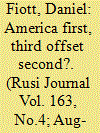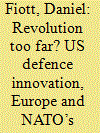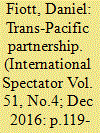|
|
|
Sort Order |
|
|
|
Items / Page
|
|
|
|
|
|
|
| Srl | Item |
| 1 |
ID:
163042


|
|
|
|
|
| Summary/Abstract |
In 2014, the US Department of Defense announced that it would embark on a new defence innovation initiative termed the ‘Third Offset Strategy’. This Obama-era strategy was conceived to overcome the perceived military-technological rise of states such as China, Russia, Iran and North Korea. Since the election of President Donald Trump, however, questions about the continued relevance of the Third Offset Strategy have emerged. Daniel Fiott considers the factors that are driving forward defence innovation efforts in the US under the current administration, and the challenges of doing so.
|
|
|
|
|
|
|
|
|
|
|
|
|
|
|
|
| 2 |
ID:
154466


|
|
|
|
|
| Summary/Abstract |
The European Union (EU) and North Atlantic Treaty Organisation (NATO) are both institutions through which European states can engage in European defence–industrial cooperation. Each organisation embodies a unique set of institutional tools through which to manage issues such as the high and rising costs of defence procurement, technological innovation, defence R&D, standardisation, multinational capability programmes and interoperability. In short, the EU and NATO are institutional tools through which European states can manage the positive effects and negative consequences of defence globalisation. By drawing on an innovative conceptual framework derived from the institutional interaction literature, this article analyses how the EU and NATO interact with one another for defence–industrial issues. In doing so, the article principally aims to provide a conceptually informed analysis of the appeal of each body as a mechanism for defence–industrial cooperation and how each institution affects the other.
|
|
|
|
|
|
|
|
|
|
|
|
|
|
|
|
| 3 |
ID:
132557


|
|
|
|
|
| Publication |
2014.
|
| Summary/Abstract |
Insofar as Europe's security and cohesion have for decades been premised upon a strong American political and strategic engagement, Washington's intention to "rebalance" to Asia casts a shadow over the sustainability of a stable and coherent geopolitical order on the continent. This article argues that as the United States seeks to rebalance strategically towards the Asia-Pacific region a number of "indigenous" geopolitical trends are becoming increasingly important in Europe: an Anglo-French entente for a "maritime" Europe, a German-French "continental" project of economic and political integration, and Russia's resurgence across Europe's East. The growing prominence of competing geopolitical visions for Europe might even call into question the cohesion and direction of the institutional expressions of the U.S.- engineered Western order in Europe, namely the Atlantic Alliance and the European Union. Increasing geopolitical and institutional contestation, we contend, pose a number of challenges for both U.S. interests and European security.
|
|
|
|
|
|
|
|
|
|
|
|
|
|
|
|
| 4 |
ID:
144182


|
|
|
|
|
| Summary/Abstract |
Faced with the prospect of its adversaries mitigating its long-held superiority in sophisticated weapons systems, the US announced in 2014 that it was about to embark on a ‘third offset strategy’ in order to maintain its military-technology edge. In its quest to harness new technologies and operational concepts however, the third offset strategy is likely to raise important questions for Europe and NATO. Daniel Fiott addresses some of the major issues at hand related to alliance politics in NATO and some of the potential defence-industrial effects.
|
|
|
|
|
|
|
|
|
|
|
|
|
|
|
|
| 5 |
ID:
144106


|
|
|
|
|
| Summary/Abstract |
A quietly important element of NATO’s Readiness Action Plan (RAP), agreed at the 2014 Wales Summit, is the Alliance’s need ‘to reinforce its eastern Allies through preparation of national infrastructure, such as airfields and ports’. Put simply, without the necessary infrastructure, including transportation networks and hubs, and energy supply lines, it will be difficult for NATO to preposition or sustain military units and ensure that the Very High Readiness Joint Task Force (or VJTF, also known as the ‘spearhead force’) is able to deploy within a few days. Yet the Alliance has limited collective financial means to modernise Europe’s defence transportation and supply links. The European Union, with its range of financial mechanisms, might be able to help.
|
|
|
|
|
|
|
|
|
|
|
|
|
|
|
|
| 6 |
ID:
153046


|
|
|
|
|
| Summary/Abstract |
The United States is launching another defence innovation initiative to offset the growing military-technological might of countries such as China, Russia and Iran. However, by utilising emerging technologies from the commercial sector to achieve greater military power the US may further open up the technology gap within NATO. This raises serious questions for NATO’s European allies. This article probes the nature of the US’s latest innovation strategy and sets it within the strategic context facing Europe today. Whether European governments, firms and militaries will join the US in its new defence innovation drive will hinge on politico-military and industrial considerations.
|
|
|
|
|
|
|
|
|
|
|
|
|
|
|
|
| 7 |
ID:
148689


|
|
|
|
|
| Summary/Abstract |
The Trans-Pacific Partnership, if ratified by all parties, is likely to have ramifications for the global defence market and the US’ economic and political strategy towards the Asia-Pacific region. Although the TPP excludes a number of defence-related issues such as defence procurement, the TPP’s provisions on technology transfers and intellectual property rights could bolster the US’ military-technology relations with the Asia-Pacific. For Europe, which is excluded from the Partnership, the likely impact of TPP is uncertain and could raise important challenges and opportunities related to Europe’s own defence-industrial relations with the Asia-Pacific and its wider security role in the region.
|
|
|
|
|
|
|
|
|
|
|
|
|
|
|
|
| 8 |
ID:
126451


|
|
|
|
|
| Publication |
2013.
|
| Summary/Abstract |
The European Union and the United States are on the verge of agreeing to a transatlantic free trade agreement. The proposed Transatlantic Trade and Investment Partnership is aimed at boosting EU and US economic growth, but the negotiating partners have not excluded the defence sector from negotiations. Europe is at a tipping point regarding the rationale for its defence-industrial integration efforts. Any TTIP extending to the defence sector will raise questions about the nature of the European Defence Technological and Industrial Base, and, crucially, how it impacts the North Atlantic Treaty Organisation and the Common Security and Defence Policy.
|
|
|
|
|
|
|
|
|
|
|
|
|
|
|
|
|
|
|
|
|